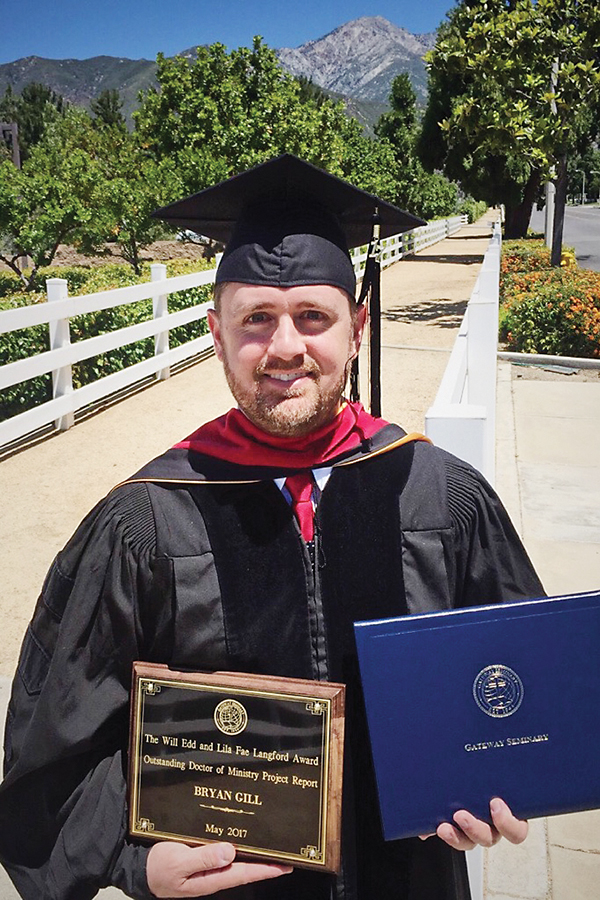By Grace Thornton
The Alabama Baptist
Bryan Gill said he got into an online doctoral program a little bit by accident.
“I signed up when I lived in Memphis,” said Gill, now associate director of the office of professional studies at Samford University in Birmingham.
The program was a new one offered by Gateway Seminary (previously known as Golden Gate Baptist Theological Seminary) in California.
Gateway’s plan was to try setting up cohorts in a few places scattered from Memphis to Alaska to Japan, Gill said.
“But there weren’t enough people in those cohorts to merit their own cohort, so they decided to form one online cohort out of all those regional groups,” he said.
‘New ground’
It was something new — Gateway had never done it before. Classes were online but synchronous, meaning at a scheduled time. Gill and other students sat in front of their computers and listened to an instructor as if they were in a live class together.
“That was all kind of new ground,” he said.
He graduated with his doctor of ministry in 2017 — the first of that cohort to graduate.
The program “is something that would be beneficial for somebody like me who has a full-time job and a family and also can’t physically go to the campuses on a consistent basis,” Gill said.
One thing that gave him a leg up in the program was his proximity to the Samford library for research, he said. Another factor that helped Gill was the way Gateway divided his cohort into smaller groups that could serve as an online community for each other.
“That helped us to kind of have a support group,” he said. “You are studying by yourself and you feel like you’re all alone in this. The community aspect is so important.”
So important in fact that Gill based his entire ministry project around the spiritual formation of online students — knowledge that would help him assist online students at Samford, he said.
“I enjoyed the program. I thought it was great,” Gill said. “I really enjoyed my time with the professors, even the time that was remote. It was one of the most rewarding things in my life. I wouldn’t trade it for anything.”
Gateway Seminary offers an online option for many of its cohorts.
The program requires one 10-day trip to one of its campuses. The rest of the seminar work is done online. For more information, email dmin@gs.edu.
Other seminaries
• Southwestern Seminary offers online doctoral studies taught via flex access. Though certain aspects of the program — orientation, a comprehensive exam and dissertation defense — have to be performed in person, all other requirements can be fulfilled from anywhere. For more information, visit swbts.edu/academics/campuses/online/flex-phd.
• New Orleans Seminary does not technically offer a strictly “online” doctoral cohort, but it does offer a synchronous learning platform in its Ph.D. program. Students connect via the Blue Jeans video conferencing service during a live-taught class at a set meeting time. For more information, visit nobts.edu/research/sync.html.
• Midwestern Seminary does not offer an online option for its doctoral studies. It does, however, conduct much of the work through on-campus intensives and work done at home, so relocation to Kansas City isn’t necessary.
• Southeastern Seminary doesn’t offer an online doctoral program, but it does offer an Ed.D. and D.Min. as part of a modified program with online components combined with on-campus intensives. This still makes degree completion possible without relocation. For more information, visit sebts.edu/advanced.
• Southern Seminary doesn’t offer a doctoral program that can be completed online, but many of its programs offer flexible on-campus coursework options that can be completed without relocating to campus.
• Beeson Divinity School does not offer an online option for its doctoral program. For information on the degree options at Beeson, visit beesondivinity.com.






Share with others: